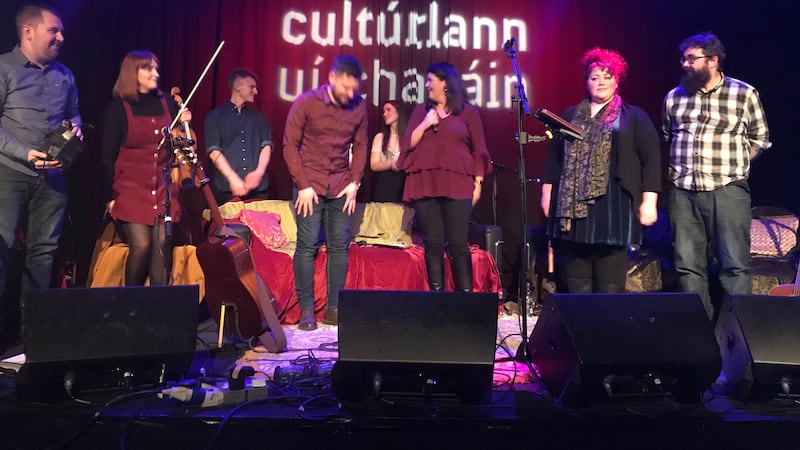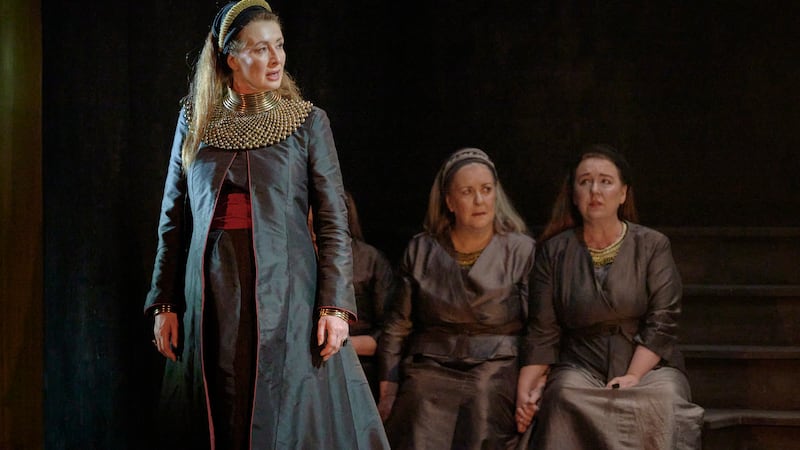CAD É mar atá sibh a chairde, how’s it goin’ dear readers and loyal fans of the Bluffer’s Guide to Irish.
The Bluffer was up in Derry on Friday night for a concert dedicated to songs of migration and displacement.
Imirce is migration but if you want to be more specific, inimirce is immigration while eisimirce is emigration.
Imirceach - is a migrant – or an ex-pat if you’re white and middle class and the plural is imircigh.
I have sometimes thought about how it would feel to have to leave my home, my belongings, my country when I didn’t want to and how lucky I am that that has never happened to me.
Even le linn na coimhlinte anseo - during the conflict here, I was never forced to leave my home – although I lived near Bombay Street which was burned to the ground in 1969 (as were some houses on Kashmir Road where I grew up.)
Many people did leave their homes when the Troubles broke out here some never to return.
But there are many complicated reasons why people become emigrants.
D’fhág siad Éire ar chúisanna eacnamaíochta - they left Ireland for economic reasons is something that could be said for the millions who took “the white boat” to a new life.
Thug sé an bád bán air féin - he emigrated. Michael Ó Conghaile explain that the bád bán referred to a certain white passenger ship which brought Irish emigrants abroad to Britain or the US.
To make things easier, of course, you could just say something like bhog muid do Sasana - we moved to England.
The reasons of course, could be gorta - famine, dífhostaíocht - unemployment, leatrom - oppression, cogadh - war or simply the desire to create a better life for yourself and your family.
Some people go thar lear - abroad to try and recover from a broken heart.
All the above were reflected in the songs we heard at Derry’s Cultúrlann Uí Chanáin on Saturday when Alan Burke, Niamh Farrell, Niall Hanna and Ríoghnach Connolly chose their favourite emigration songs prompted by BBC presenter and Irish News columnist Lynette Fay.
Let’s face it, it was never going to be a bundle of laughs.
With the Coming Home: Art and the Great Hunger exhibition (a must-see) on next door in the Glassworks, many of the songs referred to An Gorta Mór - the great hunger which saw many of those who didn’t die take the “coffin ships” across the Atlantic.
The songs ran the gamut of emotions from fearg - anger, brón -- sorrow, diongbháilteacht - determination and dóchas - hope but one song came with the warning that the oppressed can also became the oppressors.
And yes, while most of the songs were sad, the Bluffer has always believed that beauty is the flip-side of sorrow.
There was binneas - sweet tunefulness in the songs even in the ones with cutting edge.
We heard amhráin thraidisiúnta - traditional songs as well as songs written by Bob Dylan and one written by Alan Burke himself when he was himself an emigrant in England in the 1980s.
Emigration has changed immensely even in the nearly 40-odd years since with facetime and skype but it remains traumatic for many.
CUPLA FOCAL
Imirce (imirka) - migration
inimirce(inimirka) - immigration
eisimirce(eshimirka) - emigration
Imirceach/imircigh (imirkakh/imirkee) - migrant(s)
le linn na coimhlinte anseo(le linn na kivlintcha anshaw) - during the conflict here
D’fhág siad Éire ar chúisanna eacnamaíochta (daag shade ayra er khooshanna eknameeakhta) - they left Ireland for economic reasons
Thug sé an bád bán air féin(hug shay un baad baan er hane - he emigrated
bhog muid go Sasana(wug midge gaw sasana) - we moved to England.
gorta(gorta) - famine
dífhostaíocht(jeeawsteeakht) - unemployment
leatrom(latrom) - oppression
cogadh(cugoo) - war
thar lear (har laar) - abroad
An Gorta Mór (un gorta more) - the great hunger
fearg(farag) - anger
brón - (brone) - sorrow
diongbháilteacht(jingwaaltchakh) - determination
dóchas (dawkhiss) - hope
binneas (binyiss)- tunefulness
amhráin thraidisiúnta (ore-aan hradishoonta) - traditional songs


